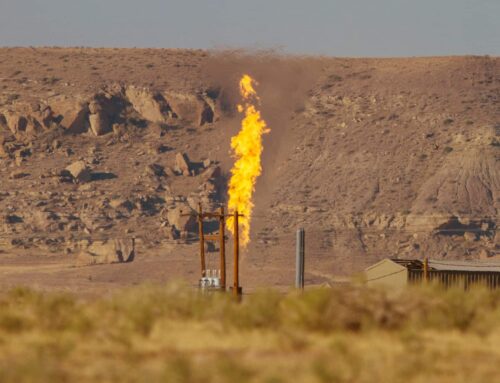OnPoint E&E TV
SYNOPSIS:
As the debate over subsidies heats up, should Congress be considering a complete overhaul of the tax code? During today's OnPoint, Stephen Ellis, vice president at Taxpayers for Common Sense, gives his take on discussions surrounding the oil and gas and ethanol industries' tax breaks and subsidies. He also discusses the political prospects for passage of a bill that repeals current tax breaks.
TRANSCRIPT:
Monica Trauzzi: Hello and welcome to OnPoint. I'm Monica Trauzzi. Joining me today is Stephen Ellis, Vice President at Taxpayers for Common Sense. Steve, thanks for coming on the show.
Stephen Ellis: Thanks for having me.
Monica Trauzzi: Steve, the debate over subsidies is dominating discussions here in Washington this week. Big oil and corn ethanol are the two big focus industries, so let's clearly define what's happening here. What is the oil industry receiving? Is it a subsidy or tax breaks?
Stephen Ellis: Well, I mean they are sort of two sides of the same coin. I mean essentially you're talking about — I mean you can provide subsidies in a lot of different ways. You can provide subsidies through direct spending, so cash out the door. You can provide it through guarantees like loan guarantees or, in the case of ethanol, a mandate to purchase it or you can provide it through tax breaks. And so in the case of oil industry, they're getting very lucrative tax breaks and have for nearly a century.
Monica Trauzzi: So the oil industry is arguing that with the proposed measures that are on the table right now their taxes would be raised, so it's an extra tax that would be placed on them. How do you see it?
Stephen Ellis: Well, essentially you have a corporate tax rate. You know, you have an established corporate tax rate and then we have various incentives through tax breaks, expenditures, however you want to term it, or tax credits or tax deductions that the industry gets for doing certain things sort of to encourage certain performances or encourage other activities. So these are not essentially — I mean are they going to end up paying more taxes if you eliminate this tax break or tax expenditure? Yes, but that isn't necessarily a bad thing, particularly in the consideration that we're looking at, overall in the corporate tax code, cutting the top rate, which is a very large rate in economically developing — OECD countries and reducing — and expanding the base. So essentially cutting the rate, expanding the base by eliminating all of these tax preferences that have littered the code and that just kind of pile up on top of one another.
Monica Trauzzi: Well, it seems like here in Washington big oil is a dirty word. Is the industry being penalized for being so profitable?
Stephen Ellis: Well, certainly they've got a target on their back, there's no doubt about it. I mean they are incredibly profitable and they have done very well and there's some ire and pitchforks out there in the public about the gas prices. But the reality is, we do have a $1.65 trillion budget deficit this year that we have got to look at ways to tackle it. And one of the things that we're looking at is cutting spending, tackling entitlement reform and reforming the tax code. And, clearly, this is a major area. They get significant breaks and they're doing very well. And so this is something that I think that the public also thinks need to be looked at.
Monica Trauzzi: There's all this talk about leveling the playing field, so if oil industry tax breaks are going to be repealed, does that mean that other energy industries should not be receiving certain tax breaks?
Stephen Ellis: I mean we've certainly argued that leveling the playing field would be better across the board, even, you know, the people who are renewable energy types that are fighting for their various credits, you know, in some level you've got to look at leveling the playing field and that they're going to actually do better in that scenario. And the other thing is, is that, you know, we have had lawmakers who — a lot of who owe their jobs to saying out there that they're going to cut spending and they're going to cut the government and the cost of government. And so we're looking to Congress to actually hold up to what they argued and tackle some of these tax expenditures.
Monica Trauzzi: It seems up until this point though that the discussion about the tax code has been pretty piecemeal. Does Congress really need to take a look at the whole thing and revamp it? I mean they haven't really done that in a couple of decades.
Stephen Ellis: Right, I mean the last major tax reform was in 1986 and then after that there's a thing I would call tax entropy or, you know, it's like a forest. You know, you have a forest fire and then over time the underbrush develops. Well, we've developed a lot of underbrush in the tax code over the last couple of decades and so we need to cleanse the code and remove a lot of these breaks and subsidies that we've been tacking on. And some of them are firmly entrenched, like a tick in a dog's back. You've got some of these tax breaks for the oil and gas industry dating back to the 19-teens. Things like intangible drilling costs and things along those lines.
Monica Trauzzi: So Senator Reid has said that this is a top priority for this session, but let's bottom line this. I mean does something like that, repealing oil company tax breaks, does that have any legs? That would be a huge day in Washington if those were repealed.
Stephen Ellis: It certainly would be a big day in Washington, but I think that those big days are coming. You know, we do have the day of reckoning with, you know, an enormous budget deficit at 1.6.5 trillion. We've got the issues around the debt ceiling being raised and so we've got the fiscal commission at the end of last year making recommendations to eliminate a lot of the tax expenditures. So really, to some extent, there's kind of two roads converging here. We have kind of ire and concern about the subsidies that the oil and gas industry gets and then there are huge profits. And at the same time we have an overall effort toward tax reform. And so it would seem to me that that might be a good place to start and could actually have a ripple effect throughout the rest.
Monica Trauzzi: API recently released data about the benefits of oil company profits on retirement accounts. And I'm curious if you think that there are-you're laughing, if Americans are really seeing direct benefits as a result of the high profits of the oil industry.
Stephen Ellis: Well, I mean clearly, there are people who are invested in these companies. I mean they're publicly traded companies and those people are doing well and there are pension funds and that was their argument, was that, you know, firefighters and policemen that have these pension funds, well, they're doing well because they're invested in there. And that that's the reason, which is true, but that's the reason that we should continue subsidies or increase subsidies to them and that's just ridiculous. It doesn't make any economic sense to think that — why would we do that? I'm sure they're holding stock in Microsoft or Intel. Does that mean that we should provide tax breaks to Microsoft and Intel because it'll benefit the pension funds? I mean this is several banks shot and so in reality, those people would be better off if we actually removed some of these tax breaks going to the oil and gas company so that we don't have a bankrupt country.
Monica Trauzzi: Let's switch gears and talk about ethanol. Why do you oppose the current ethanol subsidy?
Stephen Ellis: Well, you know, right, you can — as I was talking about earlier, you know, government has a variety of ways to support an industry. You know, you can give it direct spending through tax breaks or other ways. You could give it-you can mandate its use. You could protect it with a tariff on foreign competition and with ethanol we have all three. And so, in reality, we are spending billions of dollars every year propping up this industry and we've done it for decades and it's time for ethanol to stand on its own two feet and see if it can make its way in the marketplace.
Monica Trauzzi: Growth Energy has laid out a plan which they discussed on our show last week that would essentially redirect subsidy money towards building infrastructure. You don't think that's a good idea though?
Stephen Ellis: No, the thing is, is that when you go from a tax credit, which you can presumably get rid of within, you know, just with a congressional action. Once you start building infrastructure, you've actually got a major investment in place and it's going to be much harder to stop it and to prevent it , besides the fact it's all been directed at this one industry and that's really the cost of doing business. And so if the ethanol industry thinks that they need to have blender pumps and they need to have pipelines, well, then build it. But why should Uncle Sam, why should the taxpayers subsidize this, continue to subsidize it and give them — better their bottom line?
Monica Trauzzi: All right, it's a heated debate. We'll end it right there. Thank you for coming on the show.
Stephen Ellis: Thanks a lot.
Monica Trauzzi: And thanks for watching. We'll see you back here tomorrow.










